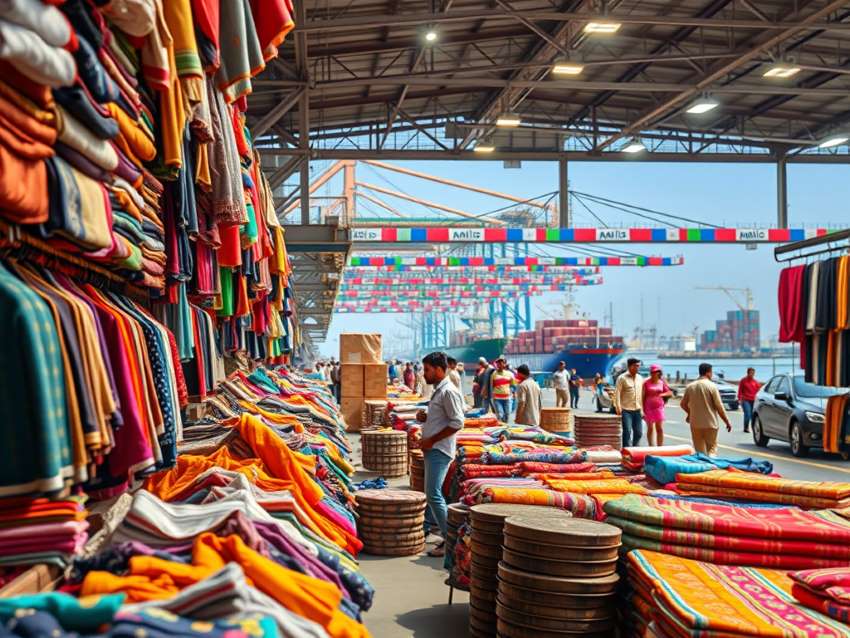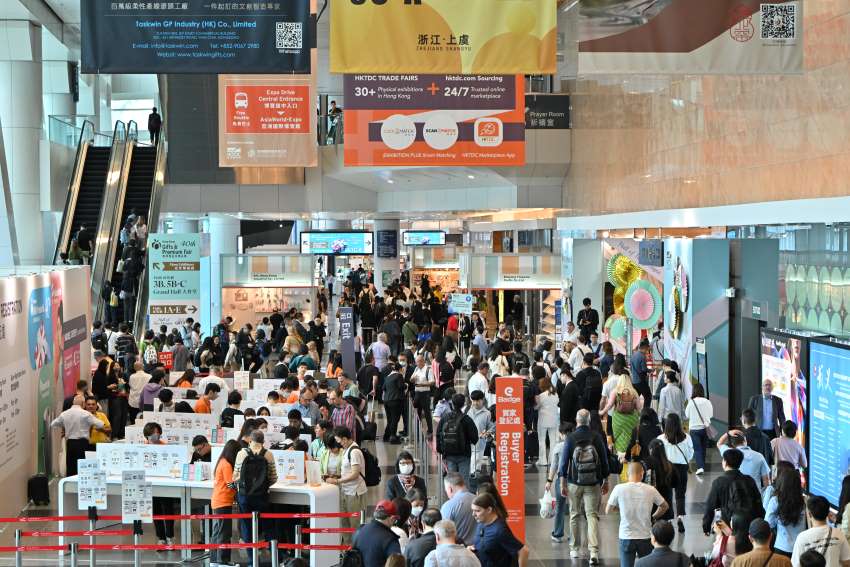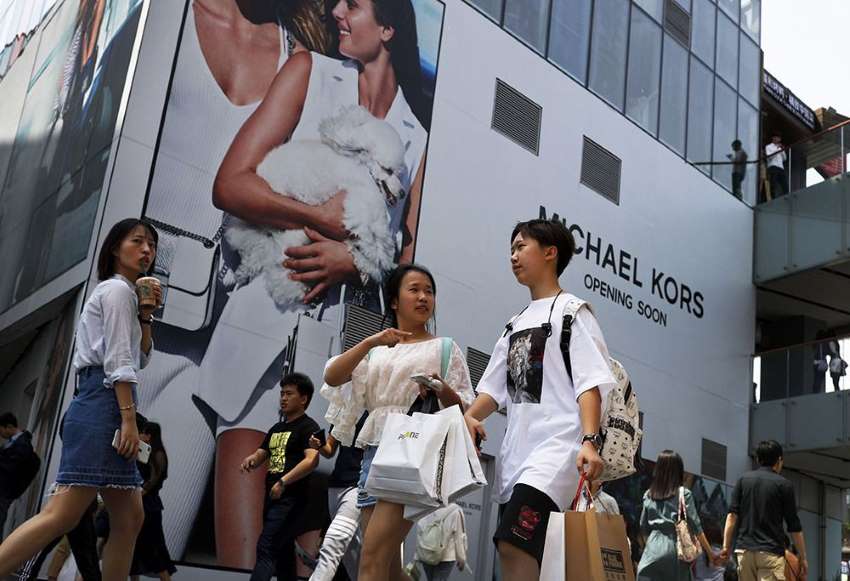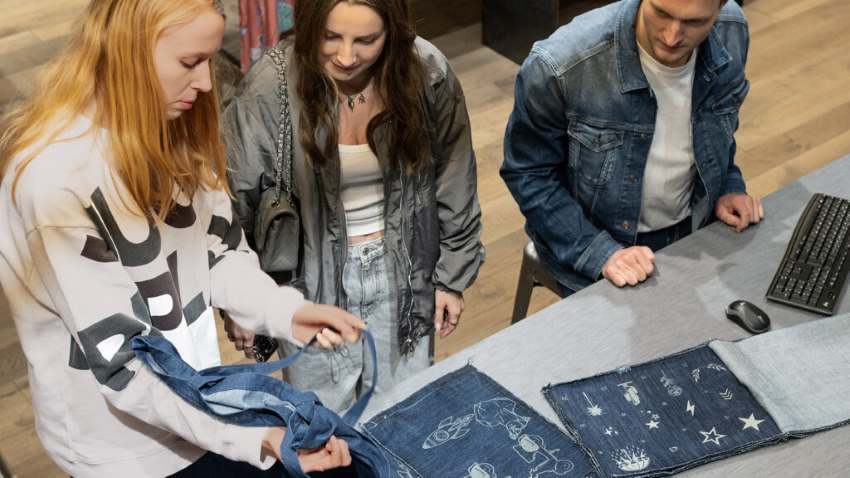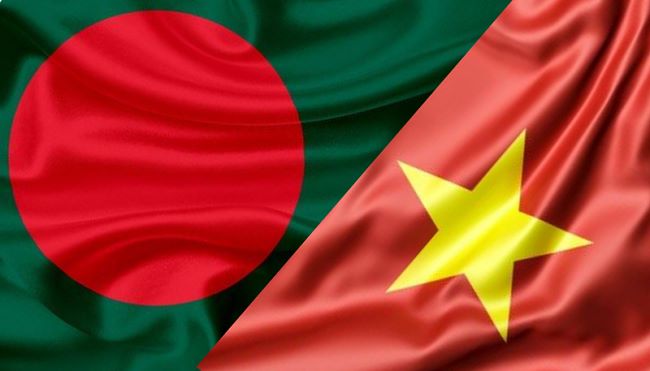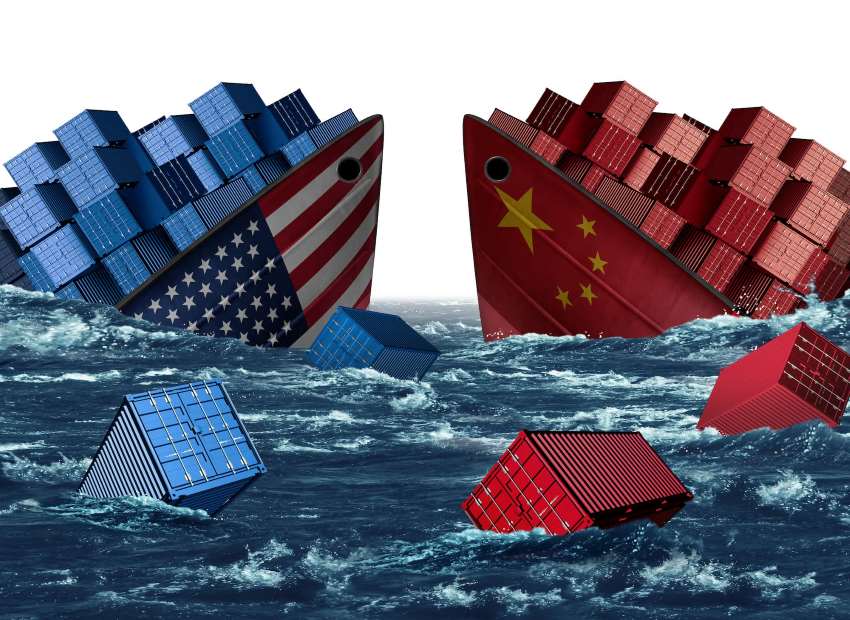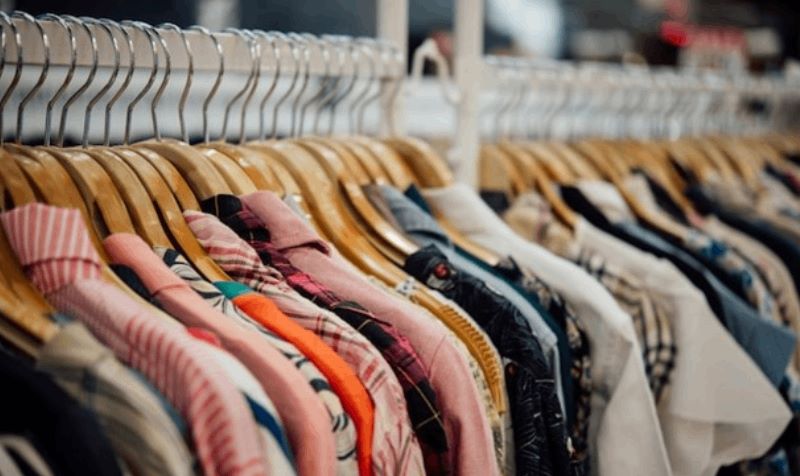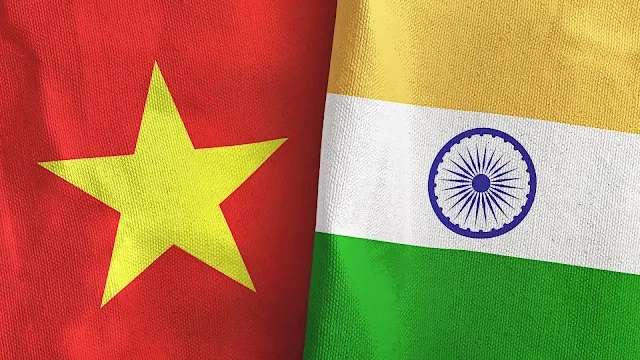FW
Bangladesh and the European Union will form a joint business council soon to boost trade between the two partners. As per the plans, representatives from the private sector will be incorporated in the Bangladesh-EU council to take business ties between the two partners to a new height. Commerce minister Tofail Ahmed briefed a visiting EU delegation on the progress made by Bangladesh for safer working environment at the factory level under the Sustainability Compact.
After the collapse of Rana Plaza building, Bangladesh signed the International Labour Organisation-brokered Sustainability Compact with the EU in 2013, committing to responsible business behaviour. Later, the US and Canada joined the deal. Two follow-up meetings of the Sustainability Compact, so far were held to review the progresses of workplace safety and labour rights. According to Ahmed, Bangladesh has fulfilled almost all conditions put in the Compact and the EU delegation is also satisfied with the progresses.
Ahmed said that the three agencies - Accord, Alliance and the National Action Plan - have completed inspections of 3,800 factories for deficiencies in structural, electrical and fire safety.
China will cooperate with Azerbaijan in cotton production. A plant will be set up in Azerbaijan for production of seedless raw cotton and cotton seed, based on new technologies. Cooperation with China is of significant importance in terms of development of seed farming, cotton processing and seed cleaning in Azerbaijan.
Azerbaijan is keen to give new life to the cotton production industry. The country was famous for high production of cotton the last century and was a leading cotton producer in the Soviet Union. However, over the past 18 years, production dipped six fold. Areas under cotton reduced nine times. Despite the heavy demand, the decrease in interest in cotton resulted from the low profitability margins of cotton production. Azerbaijan collected 35,000 tons of cotton in 2015, which is 14.6 per cent less than in 2014. This was the lowest indicator of cotton production in Azerbaijan since 2010.
The target for 2016 is to plant cotton on 30,000 hectares of land (80 per cent more than the previous year), and to supply 70,000 tons of raw cotton. China is the largest cotton producing country in the world. Some 300 million people are involved in cotton production in the country’s 24 provinces.
Argar Technology’s trump card while the ideating the production of HV (high visibility) fabrics was to manufacture new knitted fabrics to substitute 100 per cent polyester regularly used to achieve the chromatic specification fixed by EN20471 rules. Argar, double knitting technology was innovatively applied in the production of its high visibility HVis-Tes® Knitted Fabrics. In its new HVis-Tes® range of products the external face of fabric is now 100 per cent polyester, while the internal face is 100 per cent pure cotton.
According to the company, this peculiar interlacement guarantees at the same time the extraordinary features of durability and endurance of a polyester fabric and the comfort that only a cotton fabric is able to provide in touch with the skin. On customer’s request they are also available with antibacterial and UV-protection treatment (complying respectively with EN20645:2005 + EN20743:2007 and AS/NZS 4399:1996 norms).
The range of HVis-Tes® ESD Knitted Fabrics adds to the advantages of the high visibility items with the antistatic function given by conductive fibers. The features of HVis-Tes® ESD Knitted Fabrics fully comply with the specifications of EN20471, EN1149 and Oeko-Tex ® Standard 100 Class II Certifications rules.
Similarly, the features of Noflam®-HV Knitted Fabrics fully comply with the specifications of EN11612, EN20471 and Oeko-Tex ® Standard 100 Class II Certifications rules. The company guarantees knitted fabrics, which are fully manufactured and ennobled in Italy and mostly have European Preferential Origin. The few items of the standard collection which have no Preferential Origin Status can be manufactured with Preferential Origin upon Customer’s request.
Klopman has developed a new range of products made with recycled polyester. Europe’s leading brand in work wear has been involved in the production and marketing of blended fabrics in 65 per cent polyester and 35 per cent cotton since 1968.
Today, the basic yarn utilized for the making up of work wear garments can be replaced by similar materials aimed at reducing the environmental footprint, conservation of resources and to support developing countries. Recycled polyester is made from PET plastic bottles, a resource that would otherwise end up in landfills. The challenge for the company was to develop a sustainable product capable of maintaining the features and fabric standards in terms of comfort and durability.
The company also constantly applies its commitment to innovation in accordance with ethical and environmental considerations. From the selection of raw materials through weaving, dyeing and finishing, the company is constantly working to minimise the use of toxic substances, reduce waste, reduce energy consumption and to sustain the development of renewable energies.
The company is also equipped with advanced air extraction systems, which are installed throughout the factory, filter and purify the air by minimising the impact of harmful substances into the outside environment.
www.klopman.com/
Karl Mayer has developed new machines and applications for warp knitting, weaving warp preparation and composite fabrics. The company innovates in functional sportswear up to the use of carbon fiber in cars.
It offers high performance warp knitting machines, producing new and sophisticated fabrics for automotive applications, and for sportswear, including seamless garments. For the weaving industry, Karl Mayer has an automatic sectional warper for the flexible production of high-precision warp beams. For sizing the company offers a VSB size box, a revolutionary new development that will generate significant savings. Another key area is for the composites industry, and an innovative carbon fiber spreading unit.
The Karl Mayer Academy holds fabric forming familiarisation courses, providing more insight in the application possibilities of the presented technologies.
Germany. The company offers raschel machines, lace machines, warping machines, tricot machines. Specialist machines are also available for producing stretch and non-stretch fabrics. India is an important market for Karl Mayer, as its the second most important sales region for its warp preparation business unit. In some sectors, such as direct beaming and sizing machines, Karl Mayer has a market share of more than 90 per cent.
www.karlmayer.com/
The recently concluded ‘Immagine Italia 2016’ under garments trade fair that took place in Florence hosted around 250 brands exhibiting their latest products. Prominent among them were the most prestigious companies in the national and international market, with 30 per cent coming from France, Spain, Germany, Austria, Belgium, Switzerland, Poland, Slovenia, Latvia, the Netherlands and Brazil.
Fashion has become the main stay for the fair, with lingerie and accessories on display and paraded on catwalks, closely interlinked with latest fashion trends. The shows featured a variety of luxurious and modern looks. The Chamber of Commerce of Pistoia this year, follows an internationalization strategy aiming at increasing the number of foreign buyers coming from 17 countries all over the world viz. Saudi Arabia, Turkey, Egypt, Russia, Ukraine, Czech Republic, Poland, Lithuania, Belgium, Malta, Cyprus, Greece, France, Germany, England, Spain, Portugal, and Lebanon. Among them are luxury boutiques, department stores, retail shops, online stores, chain stores, commercial agents, distributors and importers.
Italian company, Lanfranchi Spa’s new positioning marks a step forward in combining the power of creativity and the innovation DNA with a responsible mission for the future. The world leader in the design and production of zips, announces a step forward to show how sustainable standards add value to an established know-how and a creativity-driven approach.
According to Gaetano Lanfranchi, CEO of Lanfranchi Spa, the company believes that sustainability and innovation are the keys for a market competitive and contemporary offer. Citing this as the reason for their commitment to Greenpeace Detox programme which can prove, all their products are free of the Detox blacklist polluting ingredients.
Two projects reflect the new positioning: S/S 2017 new products and the creation of custom-designs with an upcoming designer for her debut fashion collection. According to Lanfranchi, to be at the forefront of innovation it’s important to work both on people and designs. That’s why we wanted to support Valeria Di Cerce in cooperation with NABA (Nuova Accademia delle Belle Arti). The collection will be shown at Munich Fabric Start, Milano Unica and Première Vision. For the same reasons products have been created to embrace brands and professionals creative solutions, commented Gaetano Lanfranchi.
With a capacity expansion of Rs 621 crores, Nandan Denim, India’s second largest and the world’s fifth largest denim fabric company is set to become Asia’s biggest denim fabric maker by June this year. Currently, the company’s capacity is 99 million meters per annum (MMPA), putting it at the second spot behind Arvind, whose capacity is 108 MMPA. If the Gujarat-based Nandan claims are to be believed, in four months its capacity will rise to 110 MMPA, making it India’s and indeed Asia’s largest denim maker.
Deepak Chiripal, CEO, Nandan Denim says, the company is at an advanced stage of completing their expansions. The denim industry in India is growing at 15 to 18 per cent a year. Several international players have begun to source denim from India due to raw material and other input advantages apart from stable economic and political environment.
Both Arvind and Nandan Denim are based in Ahmedabad, Gujarat. While Nandan Denim was set up in 2004 and is a part of the Chiripal Group established in 1972, Arvind was founded in 1931 as part of the Lalbhai Group, whose first manufacturing unit, Saraspur Manufacturing Company, was set up in 1897 to produce cotton yarn.
It was Arvind’s success in the denim business that prompted the Chiripals to enter the segment. Nandan’s original capacity was only 6 MMPA, and it has gradually scaled up in the wake of growing Indian and global demand. Nandan officials said the company exports denim to 28 countries and has 3,000 employees at its facility in Gujarat.
"Experts feel Bangladesh might lose its competitive edge in global apparel business after the signing of the trade pact. Their exporters may face an uneven and tough competition. TPP is aimed at cutting trade barriers and setting common standards for 12 countries. More than 18,000 taxes imposed by various countries on the US products will be eliminated under it, when it comes into effect."
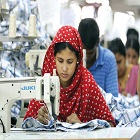
Bangladesh needs to revamp its trade policy so that it can be better prepared to face the situation that may herald the beginning of a new era of trade liberalisation globally through 'mega-regional' agreements. The fear about Bangladesh finding itself in a situation where it loses its current position as the world's second largest apparel exporter is quite worrying, feel experts. World’s one of the biggest multinational trade deals TPP was signed by 12 member nations in New Zealand recently but the trade pact will require years of tough negotiations before it becomes a reality. The deal, which will cover 40 per cent of the world economy, has already taken five years of negotiations to reach the signing stage. Analysts say the massive trade pact will still require years of tough negotiations before it becomes a reality.
Bangladesh might lose competitive edge

Experts feel Bangladesh might lose its competitive edge in global apparel business after the signing of the trade pact. Their exporters may face an uneven and tough competition. TPP is aimed at cutting trade barriers and setting common standards for 12 countries. More than 18,000 taxes imposed by various countries on the US products will be eliminated under it, when it comes into effect. The deal could reshape industries and influence everything from the price of cheese to the cost of cancer treatments.
Currently, Bangladesh garment exports to the US are subject to 15.62 per cent duty that are paid by the importers there, whereas Vietnam's RMG exports are subject to only 8.38 per cent import duty. The deal will make Vietnam's garment exports to US completely duty-free. Whereas, Bangladesh's duty-advantage on garment exports to some other TPP member-countries - Canada, New Zealand, Japan, Australia and Chile - might also be affected by the new trade deal.
FDI may take a back seat
Analysts feel that investment decisions by global entrepreneurs will furthermore be effected by the new trade deal, making countries like Vietnam a stronger candidate as the preferred destinations, due to their zero-duty access to the markets of other TPP countries. Considering this, it is crucial for Bangladesh to reduce the cost of doing business to maintain the country's competitiveness in international trade. It should also look for opportunities to join such a mega deal, as some other countries are also reportedly planning to do so.
Moreover, Bangladesh needs to focus on new international markets, particularly those where its exports enjoy duty benefit. Diversification of the country's apparel items is another critical area for more value addition. Productivity in factories has to be raised to cushion against any probable losses in garment exports.
According to a study, if TPP adopts flexible rules of origin on sourcing, as favoured by Vietnam, it could boost its share of the growing apparel market from 4.0 per cent to 11 per cent, while Bangladesh's share in this market has remained almost static -- between 7.0-8.0 per cent. Currently, Vietnam is at a comparative disadvantage in the RMG sector mainly due to its higher costs of production including higher wages.
Until now, Bangladesh has been able to retain its edge in the sourcing world in spite of the higher import tariff on its export than those of Vietnam. But it is likely that TPP, when it comes into force, will trigger some trade diversion from Bangladesh to Vietnam. Bangladesh needs to pay special attention to the implications of the TPP and other incoming free-trade deals that are shaping the '21st-Century Trade Policies'.
If Bangladesh takes appropriate moves to be involved with TPP in one form or other, it may find its niche in textiles, leather and services. Otherwise, there is a possibility for a potential slowdown in the growth of its RMG sector. Certainly, long-term impacts of the TPP on the Bangladesh economy will be more important than short-term ones. Joining any effective regional initiative can provide some cushion to Bangladesh in the long term to stay competitive in the global economy.
Pakistan Readymade Garments Manufacturers & Exporters Association (PRGMEA) will hold the 15th Textile Asia 2016 International Textile & Garment Machinery Trade Fair incorporating Clothing, Fabric & Textile Asia in Karachi in collaboration with Ecommerce Gateway . Termed Pakistan’s biggest B2B textile, garment, embroidery, digital printing machineries and chemical and allied services, the 3-days trade fair will be held from March, 09-11, 2016.
The trade fair will provide an effective podium for joint ventures/ collaborations to the textile SMEs and provide a platform to its international participants to meet respective Pakistani business personals to make future business leads in Pakistan.
The event will focus on the immense buying selling potential of textile and garment industry and poised to introduce overseas suppliers of textile and garment materials, accessories and parts and machinery to the textile industry of Pakistan. This will complement their efforts for high quality, value added products and assist them to further develop their business in the export markets.
The trade fair will have more than 550 International Brands displaying their products in over 700 booths and over 500 foreign delegates mainly from Austria, China, Czech Republic, France, Germany, India, Italy,Korea, Taiwan, Turkey, UK,USA etc. will grace the event.
The organizers are expecting a visitor turnout of over 65,000 during the event.

